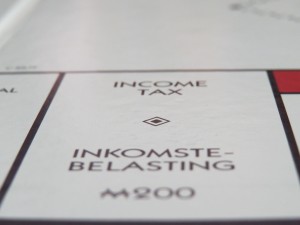1 Introduction
Estate planning may be defined as the arrangement management and disposition of the assets in a persons estate so that he his family and other beneficiaries may enjoy and continue to enjoy the maximum from such assets during his lifetime and after his death no matter when death may occur. Why does an individual enter into an estate plan? The reasons for entering into an estate planning exercise are normally threefold. Firstly the individual may wish to save taxation secondly it may be done for personal reasons and thirdly it may be necessary for commercial reasons that normally concern the flow of income. These three reasons are briefly discussed below
1.1 Fiscal objectives
Where an individuals main purpose in entering into an estate plan is to save taxation an intimate knowledge of at least four types of taxation is necessary. These are income tax donations tax and capital gains tax and estate duty.
1.1.1 Income tax
Trusts and companies are sometimes created during the estate planning process and it is normally unavoidable for the planner not to be affected by the anti-avoidance provisions of the Income Tax Act. A typical example is where an asset is transferred to a trust. Any income that the asset generates will subsequent to the transfer accrue to the trust where it will usually be distributed amongst the beneficiaries. Consequently more than one taxpayer is created by this process who will in the aggregate pay less tax than the taxpayer would have paid in respect of the income from the asset had it not been transferred to the trust. Where an asset is donated to a trust the Income Tax Act contains specific anti-avoidance provisions. If the donation is made subject to the condition that the income in consequence of such a donation shall not be distributed to a beneficiary until the happening of a certain future event such income will be deemed to be that of the donor. Further where the beneficiary is a minor and the donation is made by a parent the income in consequence of such a donation is deemed to be that of the parent irrespective of the conditions of the donation. The parties to an estate plan accept that income tax cannot normally be saved merely as a result of an estate plan. This situation can of course change on the death of the planner.
1.1.2 Donations tax
If the planner decides to reduce the value of his estate by means of making a donation donations tax will become payable. However individuals may currently donate R25 000 per annum free of donations tax. Further donations between spouses are currently exempt from donations tax. Where a person donates a limited interest in property in the form of a usufruct the determination of the value of the donation for the purposes of donations tax requires special consideration. The value of a usufruct is determined by capitalizing the annual enjoyment of the asset donated which is equated to a percentage of 12 over the life expectancy of the donor. Thus where the donor is an older person the value of a usufruct would be smaller than the case where the donor is a younger person. For instance the value of a usufruct in regard to an asset that is valued at R100 000 would be R95 154 or R54 198 where the donor is a female who is 50 or 80 years old respectively. Donations tax at the current rate of 25 would be payable and would amount to R23 789 and R13 550 respectively in the above example. There may also be capital gains tax implications in this example.
1.1.3 Estate duty
The philosophy of estate duty was explained as follows to the British Parliament towards the end of the last century The laws of nature do not give individuals the right to dispose of their assets after their death. The state has however created such laws and it is thus not unreasonable for the state to be first in the queue when on the death of an individual assets are being distributed The estate duty consequences for the planner his spouse and beneficiaries must also be considered. How can the planner reduce his estates liability relating to estate duty? The usual answer is that the planner should reduce the value of the assets in his estate. There are also other possibilities. The relative values of the assets in the estates of the spouse or other beneficiaries are also important factors to take into account – perhaps they already have estates with substantial monetary values
1.2 Personal reasons
Taxation plays a less important role where a planner has entered into an estate plan for personal reasons. These reasons may include the following
The bequest of specific assets to charitable organizations
Creation of a fund for the benefit of a family member with a physical or mental disability
Continuity of a family business or
Protection against creditors and the hiding of assets.
1.3 Commercial reasons
Where a planner enters into an estate plan for commercial reasons rather than the saving of taxation or personal reasons the issue usually centres on the control over the flow of income during his lifetime and after his death. For example will his spouse have sufficient funds after his death? Will there be sufficient funds to liquidate all his liabilities at the time of his death? Will there be sufficient cash flow to beneficiaries such as minor children? Will there be sufficient funds to ensure the continuity of a business undertaking?
1.4 Estate planning
As stated in the introduction estate planning is the arrangement management and disposition of the assets in a persons estate so that he his family and other beneficiaries may enjoy and continue to enjoy the maximum from such assets during his lifetime and after his death no matter when death may occur. Five points in this definition require special mention
Planning must take place timorously and in an orderly fashion
The above definition does not mention the saving of estate duty but emphasizes the arrangement management and disposition of the estate. The estate planning process must therefore always take cognisance of the fact that estate duty is but one part of the changing environment against which planning is performed
The estate planner must continue to enjoy the maximum from his estate and assets during his her lifetime he she must not be severed from the enjoyment of the assets he she has built up
The timing of death should be immaterial to the successful working of an estate plan. A plan which relies to some extent upon the death occurring on or after any particular time is susceptible to the unexpected and must be avoided if at all possible and
None of the steps estate plan exercise must be taken in isolation for instance where an asset is transferred to a company or a trust and the planner is a speculator the income tax implications can be very serious. The planner may have to pay income tax on any realized gain in consequence of such a transfer.


